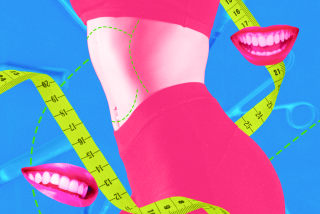Behavior Therapy an Option in Treating 8-Year-Old’s Shyness
- Share via
Question: My niece is very shy. Although she is a smart girl, she never raises her hand in class. She has a hard time making new friends and was reluctant to go to camp this summer, even though she had a good time once she got there.
This is a pattern, so my sister has asked the pediatrician about Paxil. She heard that it is good for shyness, and he is willing to prescribe it.
I am appalled that they would medicate an 8-year-old like this. I was a shy kid myself, and I grew out of it. This issue is creating tension in the family. Is Paxil safe for a child?
Answer: Paxil is approved by the Food and Drug Administration for adults with extreme shyness (social phobia or social anxiety disorder). In one study, two-thirds of those treated responded well.
Treating young children with such drugs is controversial. Antidepressants such as Paxil, Prozac and Zoloft can cause nausea, constipation, dry mouth, anxiety, tremor and insomnia. Researchers have not determined if they are safe for long-term use in shy children.
Your niece might benefit from behavioral treatment. “Social effectiveness therapy” has been shown to help up to three-fourths of shy children to learn social skills and adapt better to groups. Such an approach might be worth considering before embarking on a drug program.
*
Q: My mother is 73 and takes a lot of medicine. In addition to Lopressor and Norvasc for blood pressure, she takes Lasix, Lanoxin, Coumadin and Pravachol for her heart. Her ankles are always swollen, and she has pain in her legs and back. She has a hard time sleeping, and her doctor has prescribed Flexeril for her back and Valium to help her sleep.
All this medicine worries me. She is not her old self at all. She seems depressed and forgetful, not nearly as sharp as she used to be. She fell during the night, and that has frightened all of us. Now the doctor wants her to take an antidepressant on top of everything else. Help!
A: Your mother is already taking eight different drugs. The more pills someone takes, the greater the likelihood of side effects or interactions.
Norvasc (amlodipine) can cause swollen ankles, and Lopressor (metoprolol) might lead to fatigue, depression and forgetfulness.
We are concerned about the muscle relaxant Flexeril (cyclobenzaprine) and anti-anxiety agent Valium (diazepam), which could cause unsteadiness or dizziness and might have contributed to your mother’s fall.
Your mother shouldn’t discontinue any drugs on her own, but she needs an expert to evaluate her regimen and see if it can be simplified.
Alternatives
Q: I’ve heard that licorice can lower a man’s libido, so I thought it could help me. My husband has an overactive sex drive. He wants to make love every other day, and I just can’t get interested that often.
He loves licorice, though, so I’ve started buying licorice candy to see what would happen. Sure enough, his interest has dropped off a bit.
Last week he came back from his physical worried because his blood pressure was high. It’s never been a problem before, but the doctor wants to put him on medication. Now I’m afraid the licorice might be harming him. Did I read in your column that it could cause high blood pressure?
A: If the candy contains real licorice, it could indeed affect your husband’s libido as well as his blood pressure. A letter in the New England Journal of Medicine reported the results of a pilot study. Men who were given small amounts of licorice for a week ended up with substantially lower levels of testosterone.
In another study, volunteers were given different doses of licorice for two to four weeks. The smallest dose (50 grams, equal to several jellybeans) produced a rise in blood pressure of almost 4 points. Those on the highest dose (200 grams, or about the size of a candy bar) had their blood pressure go up 14 points.
We suggest you eliminate the licorice from your husband’s diet. Counseling might help you find a compromise that will satisfy both of you.
*
Q: My doctor recently put me on Prempro, and it is causing me trouble. I used to get migraines, but they disappeared when I stopped having periods. Now they are back with a vengeance.
What can you tell me about black cohosh or any other natural alternatives to hormone therapy?
A: Black cohosh extract is prescribed in Europe for problems of menopause, and studies demonstrate that it can alleviate hot flashes. Researchers aren’t sure whether black cohosh has estrogen-like activity.
Soy, ginseng and dong quai are other plants that act like estrogen and might be helpful.
*
Joe Graedon is a pharmacologist. Teresa Graedon holds a doctorate in medical anthropology and is a nutrition expert. Their column runs every Monday. Send questions to People’s Pharmacy, King Features Syndicate, 235 E. 45th St., New York, NY 10017, or e-mail them at pharmacy@mindspring.com.






